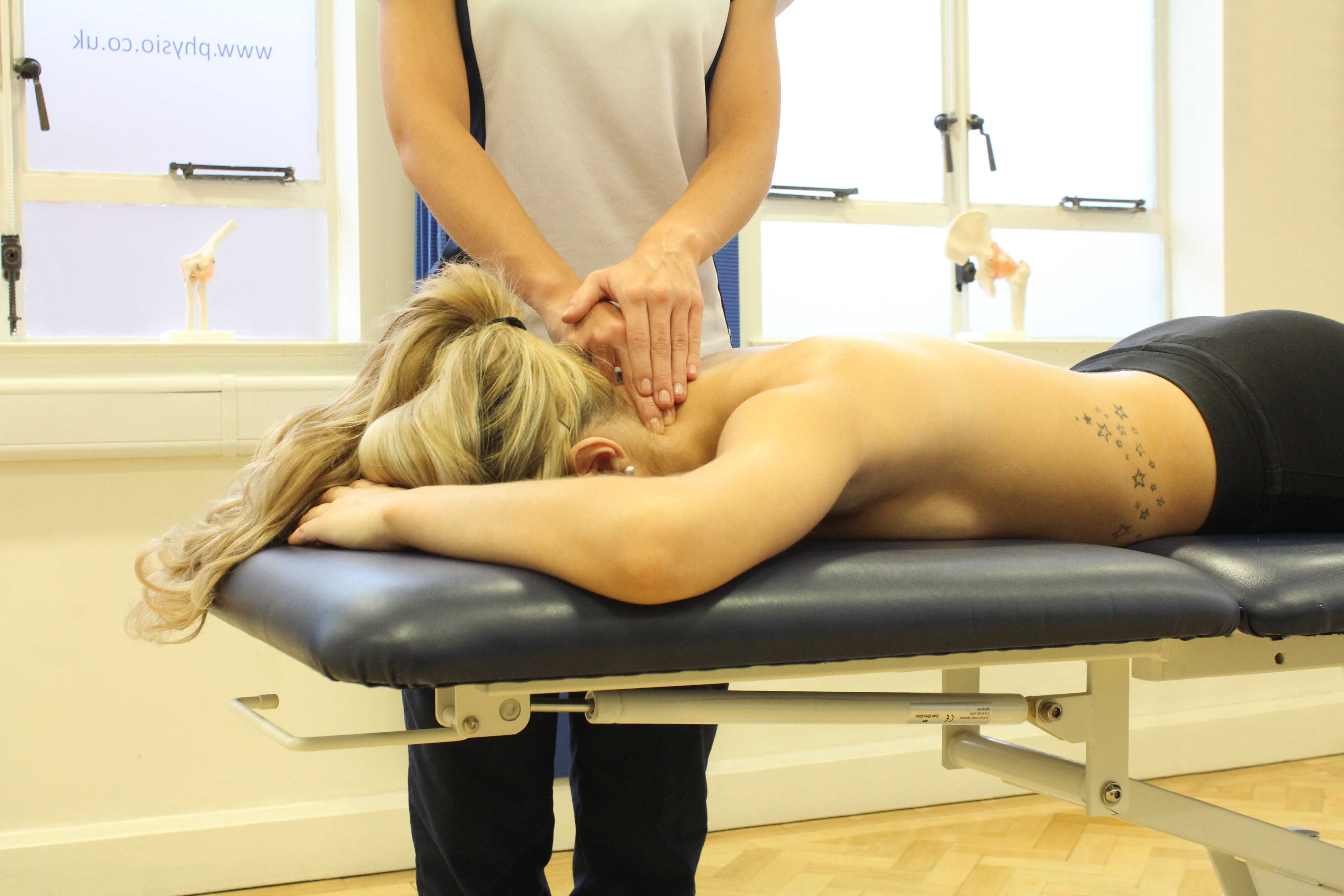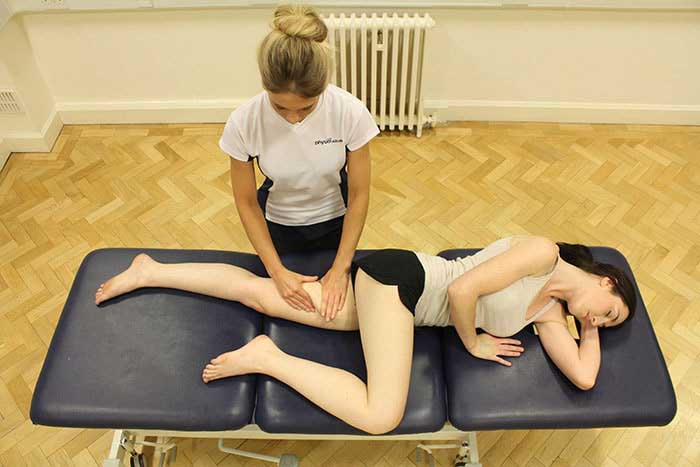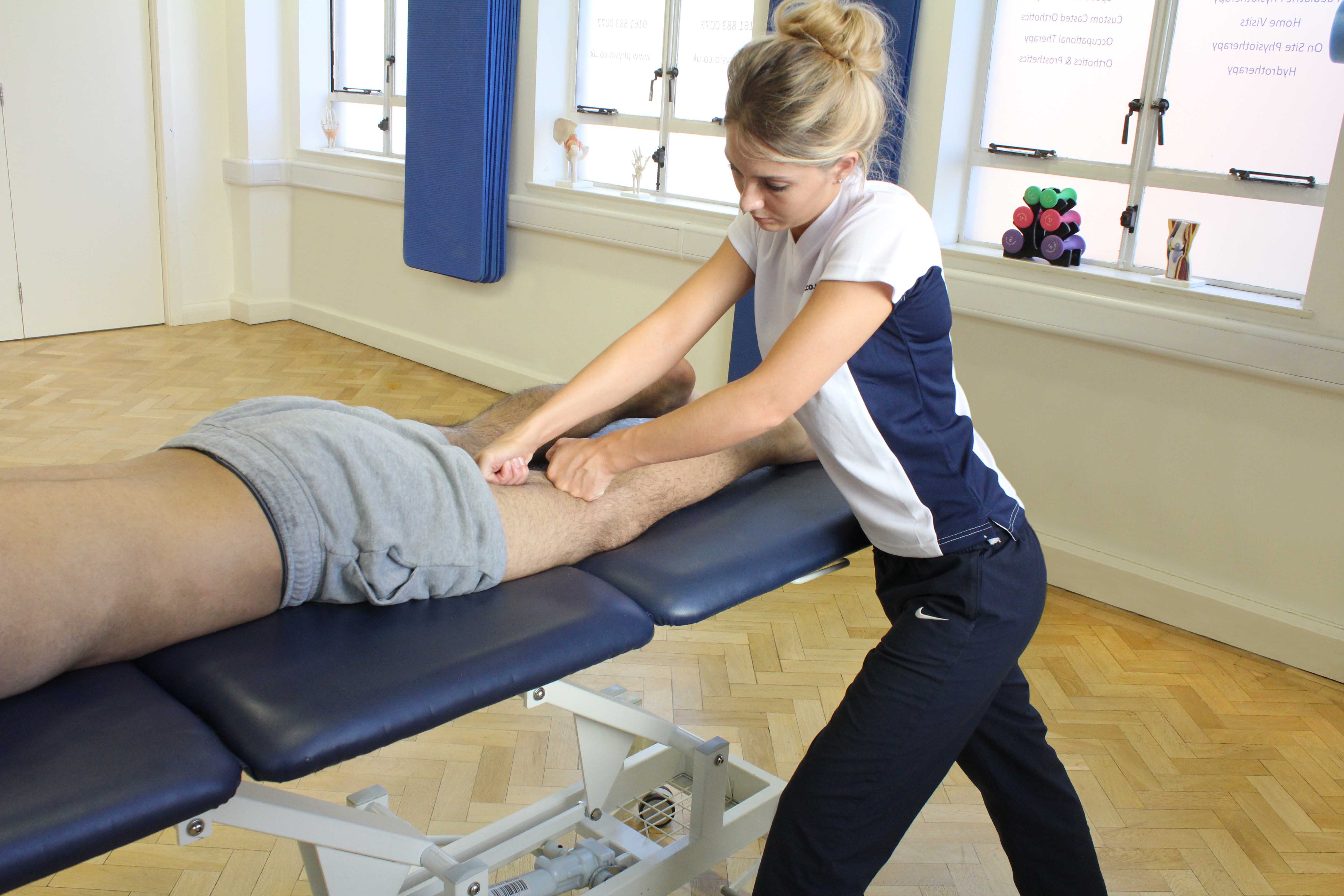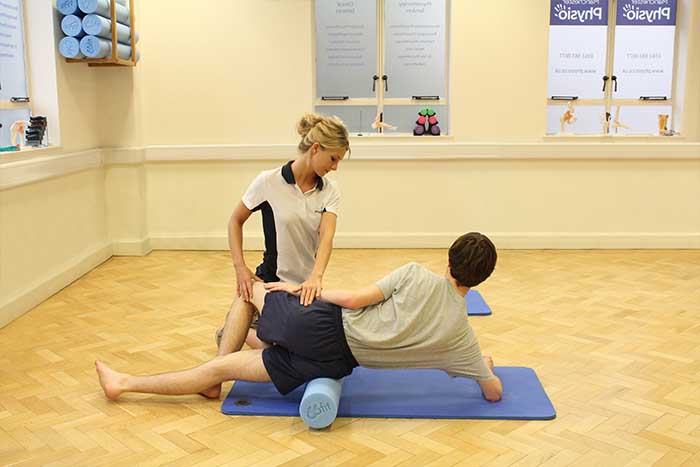The maintenance of healthy muscles is a benefit commonly gained through massage. When muscles are unhealthy, they can become weak, fatigued and more likely to become damaged. A massage will help to stimulate an increase in blood flow. Nutrients such as calcium and iron are carried within the blood which are essential to keep muscles healthy and strong. Oxygen is also carried within the blood. Oxygen provides muscles with energy within the working muscles. Our massage therapists at Physio.co.uk maintain healthy muscles through massage to help improve performance, speed up recovery and decrease pain.
What are the most appropriate types of massage to maintain healthy muscles?
Various types of massage can be used to maintain healthy muscles. The types of massage most commonly used include:
 Above: Soft Tissue Massage targeting trapezius and levator scapulae muscles
Above: Soft Tissue Massage targeting trapezius and levator scapulae musclesThe most common types of massage used to maintain healthy muscles include deep tissue massage, sports massage and remedial massage.
A deep tissue massage can be used to maintain healthy muscles. A deep tissue massage uses a variety of pressures throughout on areas of the body containing soft tissues. A deep tissue massage gets deep within muscle fibres aiming to break down adhesions, increase muscle flexibility and increase range of movement. Adhesions are formed by bundles of collagen fibres joining together to repair damaged muscle fibres and tissues after injury. Adhesions can reduce muscle flexibility and range of movement which can often lead to muscles being less used and weakening. Breaking down adhesions through a deep tissue massage can prevent muscle weakness and maintain muscular health.

Sports massage is often used to maintain healthy muscles. A sports massage is an intense style massage the also used varied pressure. Pressure can vary due to personal preference or the type of condition that a muscle is in. A sports massage encourages an improvement in blood flow and promotes an increase in healing and recovery. Increased healing and recovery, reduces damage to muscles and regular returns a muscle back to its normal working condition. A sports massage also helps to prevent injuries from reoccurring to help maintain muscle health.
A remedial massage is regularly used to maintain healthy muscles. A remedial massage aims to improve muscle condition and increase relaxation by the manipulation of muscular tissues. A remedial massage helps to repair damaged muscle fibres and tissues, increasing movement and decreasing pain. By increasing relaxation, a remedial massage can have a therapeutic effect for a person, further increasing the positive effects a massage can have. Improving muscle condition and repairing damaged muscles helps to maintain healthy muscles.
What techniques are used to maintain healthy muscles?
A range of techniques can be used to maintain healthy muscles. The most common techniques used include:
 Above: Kneading massage technique applied to bicep femoris and semitendinosus muscle
Above: Kneading massage technique applied to bicep femoris and semitendinosus muscleThe techniques most commonly used to maintain healthy muscles include frictions, effleurage and wringing.
Frictions are often used to maintain healthy muscles. Frictions are where the fingertips and thumbs are used on muscular knots that are found along muscle fibres. Muscular knots can cause tension and tightness within muscles which can lead to muscle imbalance or muscle weakness. Muscle imbalance is where one group of muscles are weaker than another causing problems such as poor posture. Muscle imbalance and weakness bot contribute to poor muscular health. Frictions involve applying pressure in small circular movements on the muscular knots aiming to increase their temperature. Increasing the temperature of muscular knots enables them to be softened and broken down. Broken down muscular knots allows a muscle to relax, relieving muscle tension and tightness and preventing muscle imbalance and weakness. Prevention of muscle imbalance and weakness using frictions maintains muscular health.
Effleurage can be used in the maintenance of healthy muscles. Effleurage is a gentle massage technique performed using flattened hands and fingers. Effleurage creates friction between the skin and fingers encouraging an increase in blood flow to the treatment area. Increasing blood flow increases the availability of healthy oxygen and nutrients and reduces muscle tightness and tension. Increasing availability of oxygen and nutrients prevents muscle fatigue, pain and weakness to therefore maintain healthy muscles.
Wringing is used to maintain healthy muscles. Wringing is another technique performed using flattened hands and fingers. Wringing involves picking up and pulling tissues from either side of the treatment area to the centre in opposite directions. Wringing varies in pressure from firm to light during wringing. A firm pressure is used when picking up and pulling the tissues and is slowly eased as they get to the centre. Wringing helps to increase elasticity of muscle tissues by rising their temperature, reducing restriction and easing pain. Temperature rises due to an increase in blood flow. An increase in blood flow supplies increased quantities of nutrients and oxygen to the muscles, helping to maintain their health.

When can a massage help to maintain healthy muscles?
Maintaining healthy muscles through massage can help in many situations. Common situations the maintenance of healthy muscles can help include:
The most common situations the maintenance of healthy muscles can help include as part of a training programme, pre event and post injury.
The maintenance of healthy muscles can help as part of a training programme. During a training programme exercise regimes can often be intense requiring a lot of muscle energy and strength. When muscle health is poor, muscles can tire, weaken and damage more easily. A massage can be an essential part of a training programme in order to maintain muscular health. A massage can prevent delayed onset muscle soreness which occurs after intense training which can often lead to an increase in muscular pain and fatigue. Maintaining healthy muscles through massage can provide full energy and strength throughout a training programme enabling a person to continue the training with no problems.
Maintaining healthy muscles through massage can help a person pre event. If muscle condition is poor before an event, injuries such as muscle stains, pulls and tears are likely to occur due to muscle weakness. Overworked muscles are often a cause unhealthy muscles as a build-up of metabolic wastes can occur within a muscle. Maintaining healthy muscles through massage pre event can prevent injury from occurring by increasing oxygen and nutrient availability. Maintaining healthy muscles can also improve performance during the event as muscles are less likely to fatigue.
Maintaining healthy muscles can help a person post injury. After an injury has occurred, adhesions form and metabolic wastes build-up within muscles. Adhesions are formed to repair damaged muscle fibres but can also become restrictive and painful resulting in muscle weakness. A build-up of metabolic wastes can increase swelling, slowing down the recovery process. A massage can help to maintain healthy muscles post injury by removing metabolic wastes from the injury site to help speed up recovery and by breaking down adhesions.
What are the physiological effects of massage to maintain healthy muscles?
Various physiological effects occur during a massage to help maintain healthy muscles. The physiological effects that most often occur include:
The most common physiological effects that occur to help maintain healthy muscle include increased capillarisation, removal of waste products and increase oxygenation.
Increased capillarisation occurs to help maintain healthy muscles. Increased capillarisation is the process of increasing the quantity of capillaries that surround a muscle. Capillaries are tiny blood vessels that help to transfer blood to all working muscles. Increasing capillarisation means an increase in blood is available for muscles. Blood contains essential oxygen and nutrients needed to maintain a muscles health. The maintenance of healthy muscles occurs by increasing capillarisation as muscle strength and energy is increased, allowing muscles to work for longer periods of time.
The removal of waste products aids in the maintenance of healthy muscles. The removal of waste products involves the stimulation of the lymphatic system. The lymphatic system is made up of many small vessels called lymph vessels. Lymph fluids are carried within the lymph vessels. Fluids that are carried within the lymph vessels contain metabolic wastes and toxins. Metabolic wastes and toxins can cause muscle weakness and prevent healing after an injury, decreasing a muscles health. A build-up of metabolic wastes and toxins can also result in inflammation which increases pain and slows down recovery. The lymphatic system is stimulated during a massage. The stimulation of the lymphatic system encourages the build-up of waste products and toxins to be removed from the body more efficiently. Removing metabolic wastes and toxins more efficiently helps to increase muscular strength, increase healing and speed up recovery, maintaining a muscles health.
A massage increases oxygenation to help maintain healthy muscles. Increased oxygenation is where an increase in blood flow occurs to supply muscles and cells within the body with an increase in oxygen. Oxygen is used as an energy source for muscles and is also important for cellular exchange. If a muscle lacks in oxygen, the muscle will tend to fatigue and not work under pressure during intense exercise or activity. Fatigued muscles decreases their overall health as this can lead to muscle weakness and injury. An increase in oxygenation occurs during a massage providing an increase in oxygen. Increasing oxygen reduces muscle fatigue therefore maintaining healthy muscles.
Summary
The maintenance of healthy muscles involves keeping the availability of oxygen and nutrients for the muscles high. A variety of massage types can be used to maintain healthy muscles including deep tissue massage, sports massage and remedial massage. A range of techniques are used throughout a massage to help maintain healthy muscles, the most common being frictions, effleurage and wringing. A massage can help as part of a training programme, pre event and post injury by maintaining healthy muscles. Physiological effects such as increased capillarisation, the removal of waste products and increased oxygenation all occur during a massage to help maintain healthy muscles. Our massage therapists at Physio.co.uk maintain healthy muscles through massage to help reduce fatigue and prevent injury.
How can I arrange a massage to maintain healthy muscles?
The easiest way to arrange a massage to maintain healthy muscles at Physio.co.uk is to email us at office@physio.co.uk or call us on 0800 033 7800.
You can also book an appointment online and save £10

 0330 088 7800
0330 088 7800



































